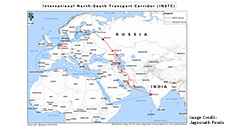Central Asia Is Not a Breeding Ground for Radicalization
Svante E. Cornell
Both in Europe and the United States, this argument is made with increasing frequency but it doesn’t reflect reality, argues Svante Cornell.
On October 31, a citizen of Uzbekistan was arrested for the terrorist attack in New York City that led to the death of eight people. The attack drew parallels to a similar truck attack earlier this year in Stockholm, as well as terrorist deeds in Istanbul and St. Petersburg. In these cases the perpetrators were of Uzbek origin. In addition, over 2,000 Central Asians have taken part in the civil war in Syria, fighting for jihadi organizations like the Islamic State or the Nusra Front. Is Central Asia a breeding ground for extremism?
Both in Europe and the United States, this argument is made with increasing frequency. Fingers are being pointed at Central Asian states, as connections are made between the radicalization supposedly going on in Central Asia and the authoritarian character of these governments and their economic problems. In other words, many appear to assume that repression and/or poverty leads to radicalization.
Related Publications
-
ISDP Annual Report 2023
ISDP’s Annual Report for the year 2023. We look back on 2023, a year in which tensions and conflicts captured the strategic space in ISDP’s focus areas, making headlines around […]
-
China in Eurasia: Revisiting BRI amidst the Russia-Ukraine Crisis
This paper discusses China’s trade and connectivity plans under the Belt and Road Initiative (BRI) in the Eurasian region and the impact of the Russian invasion of Ukraine on Chinese […]
-
Promise And Peril In The Caucasus
America’s national security bureaucracy separates the Caucasus and the Middle East into different bureaus, with Central Asia in yet another office. This is part of the reason the U.S. has […]
-
IN DEFENSE OF THE LIBERAL INTERNATIONAL ORDER
In recent years, the geopolitical fight for global economic, diplomatic, and institutional control has acutely intensified, accentuating the crisis in the existing post-World War II Liberal International Order (LIO), championed […]
-
Revitalizing INSTC: Analyzing Geopolitical Realignments and the China Factor
In recent years, the rise of Asia as the geoeconomic and geostrategic fulcrum has not only realigned global geopolitics but also reasserted the need for regional connectivity. For example, the […]




